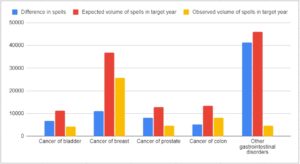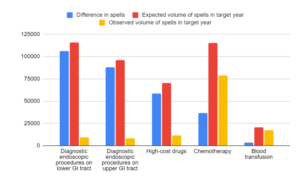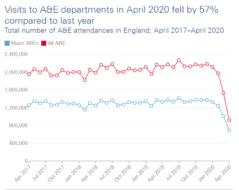A recent report by Dr Foster has found that there was a 90% drop in the expected number of admissions for people suffering with Other Gastrointestinal Disorders, in April 2020.
Based on an analysis of the last 5 years of admissions in April, the report also found that across the board there has been a huge decrease in the number of admissions into hospital.
Some of the other illnesses with much lower admissions than expected were Other Nervous System Disorders, with a 74% drop, and Prostate Cancer, with a staggering 64% drop expecting 12,859, and getting 4,640.
In the executive summary of the report, Dr Foster said: “Elective cancer diagnoses fell below expected levels as well as year-on-year (compared with April and May 2019). Breast cancer diagnoses fell 30 per cent below expected, colon cancer 39 per cent, prostate cancer 64 per cent, and cervical cancer 32 per cent.”

As well as diagnosis, the report also found that cancer-related elected procedures fell in numbers, although this was to be expected after the NHS announcement to cancel many elective treatments in order to make room for COVD-19 patients.
It found that chemotherapy observed volumes were at 32% lower than expected, and radiotherapy at 49% lower volume than expected.
Dr Chun Tang from Pall Mall Medical said: “Early prevention and screening is the key to better health. But this requires the health care systems to regularly screen the general population, especially those individuals in high-risk groups.
“I believe the issues with missing regular check-ups will be exacerbated as we see more late diagnosis of cancers and worsening chronic conditions due to lockdown.”
This is highlighted in this report as it shows the decrease in procedures that are noted to lead to the early discovery of cancers of the GI Tract.
The report said: “The reduction in elective upper and lower GI tract endoscopic procedures is stark (91-92 per cent in both). These include predominantly colonoscopies and gastroscopies, both of which are key in the investigation and diagnosis of cancers of the GI tract.”

Cancer Research UK also claims that over 24,000 cases of cancer have not been diagnosed over the course of the pandemic.
This being said, a report from the British Medical Journal has found that England has released figures that show on the week ending 2 August, there were approximately nine times fewer cases of colds, flu and bronchitis compared with the previous five year average.
The report attributes this lowering of figures to increased hygiene and cleanliness due to COVID-19, with many hoping this will also decrease the amount of other infectious diseases, giving the NHS time to breathe in the future.
Critics however say that this decrease is simply down to the lack of willingness by the general public to go into hospitals to be diagnosed now.
Dr Tang said: “Fears of going to clinics due to the risk of COVID-19 is one of the top reasons for people missing appointments.”
The Health Organisation also produced a report that stated visits to A&E in England fell by 57% compared to April last year.
The report says: “Some people may also be reluctant to use the NHS during a global pandemic, either due to concerns about being exposed to coronavirus or a desire to ‘protect the NHS’ from additional pressures.”

The Daily Mail conducted an audit of 132 documents of research relating to COVID-19 and reported that organ transplants also fell by two-thirds, and that those who died on the transplant waiting list almost doubled.
The Daily Mail Audit also reported that; “Delays in treatment are set to cause a 20 per cent rise in deaths among newly diagnosed cancer patients in England – 6,270 excess deaths this year.”
A local Manchester woman who has type 1 diabetes, told us that she has missed her routine health check up, meaning she is nearly at six months without a check, when she needs one every three months.
She said: “It is frustrating because it means my medication levels are pretty much guess work, and I don’t know what my hba1c level is because I’ve not been able to have it tested.”
There is no doubt that many people are currently being forgotten by the NHS, but for how much longer this will continue remains to be seen.
More information from Dr Tang can be found at https://www.pallmallmedical.co.uk/consultants/private-gp/general-practitioner-dr-chun-tang/







